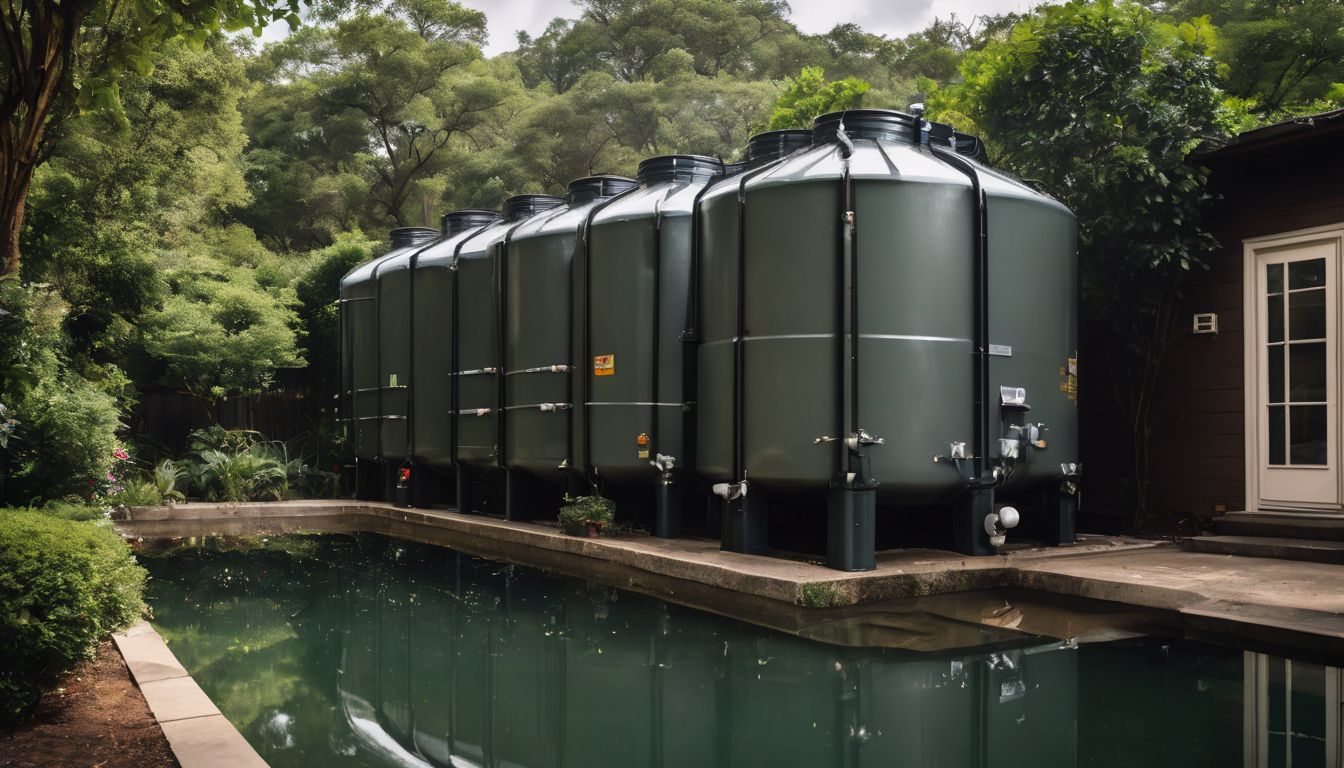Organising community gatherings often means facing the challenge of their environmental impact. Did you know that a single event can generate as much waste as five times the number of its attendees? This blog will guide you through hosting events that are kind to our planet, full of practical tips and sustainable tricks.
Let’s make a difference together!
Key Takeaways
- Choose a venue with sustainable practices, such as energy-saving features and recycling facilities, to host your event. Promote use of public transport to attend.
- Offer local and organic food options at your event and use compostable or reusable utensils to reduce waste.
- Implement efficient waste management by providing clear recycling bins and donating leftover food.
- Select promotional items that are eco – friendly, like bamboo pens or recycled tote bags, to support green living.
- Utilise virtual events and technology tools for planning which can help lower the carbon footprint of community fairs.
Why Host an Eco-Friendly Event?
Hosting an eco-friendly event not only benefits the environment but also the local economy and community. It’s a great way to showcase your commitment to sustainability and inspire others to make greener choices.
Environmental Benefits
Eco-friendly events lead the charge in reducing carbon footprints. By choosing venues that prioritise sustainability, these gatherings harness renewable resources and cut down on energy consumption.
They spotlight green living by integrating eco-conscious practices throughout the event’s duration. This proactive approach directly supports conservation efforts, preserving local ecosystems for future generations.
Sustainable conferences often incorporate Earth-friendly materials, from biodegradable plates to recyclable banners. They encourage participants to embrace an ecoconscious lifestyle beyond the event itself.
Efficient waste management systems ensure that recycling and composting become second nature at these fairs, drastically cutting back on landfill contributions and promoting a cleaner environment.
Transport needs shrink with careful planning, which not only lessens emissions but also fosters community engagement as attendees opt for shared or public transport options.
Economic Benefits
After considering the environmental advantages of hosting eco-friendly events, it’s crucial to recognise the potential economic benefits. Implementing sustainable practices can lead to cost savings, as efficient use of resources and reduced waste often result in lower expenses.
Utilising renewable energy sources and adopting environmentally friendly technology can also lead to long-term financial gains, making eco-conscious events a financially sound choice for organisers.
Furthermore, supporting local suppliers of sustainable products and services helps strengthen the community’s economy while promoting environmentally responsible business practices.
In addition to reducing costs, hosting eco-friendly events can attract a broader audience and increase participant engagement, leading to higher revenue opportunities. By highlighting the event’s commitment to sustainability, organisers demonstrate their corporate social responsibility and appeal to environmentally conscious individuals who actively seek out green initiatives.
Social Benefits
By hosting eco-friendly events, you can enhance the social impact of your activities within the community. These events provide an opportunity for like-minded individuals to come together and share their passion for environmental sustainability.
They also offer a platform for local businesses, artisans, and entrepreneurs who are committed to sustainable practices to showcase their products or services. This fosters a sense of community and empowerment among attendees, inspiring them to adopt more environmentally friendly habits in their daily lives.
Encouraging positive social interaction at eco-friendly events can help build stronger community bonds and raise awareness about the importance of sustainability. These gatherings often become catalysts for ongoing conversations and collaborations that contribute towards creating a more environmentally conscious society.
Planning an Eco-Friendly Event
When planning an eco-friendly event, it’s important to consider choosing a sustainable venue, reducing transport needs, offering sustainable food options, implementing proper waste management, and utilising eco-friendly promotional products.
These steps can significantly reduce the environmental impact of your event and promote sustainability in your community.
Choose a sustainable venue
Select an eco-conscious venue for your event. Look for locations with BREEAM certification, green building features, and sustainable practices in place. By doing so, you can reduce the environmental impact of your event and contribute to the conservation efforts.
Consider venues that offer recycling facilities, energy-efficient lighting, and water-saving measures to promote sustainability throughout the event.
When choosing a sustainable venue, opt for spaces that are easily accessible by public transport or within walking distance to minimise the carbon footprint of attendees travelling to the event location.
Reduce transport needs
To reduce transport needs and minimise carbon emissions, consider selecting a venue that is easily accessible by public transportation. Encourage attendees to carpool or use eco-friendly modes of transportation such as biking or walking.
By reducing the number of vehicles on the road, you can significantly decrease the environmental impact of your event. Additionally, consider holding virtual events or offering live streaming options to further reduce travel requirements for participants.
Support environmentally conscious choices at community events by minimising transport while promoting carpooling and sustainable modes of commuting.
Offer sustainable food options
Provide eco-conscious catering options at your event, choosing locally sourced and organic produce. Reduce meat consumption by offering plant-based meal choices to lower the carbon footprint of the event.
Incorporate reusable or compostable utensils and tableware, minimising single-use plastics and waste generation.
Select vendors who align with sustainable food practices, promoting ethical farming methods and minimal food packaging. Encourage responsible portion sizes to reduce food waste while considering dietary preferences such as vegetarian, vegan, gluten-free, or dairy-free options.
Proper waste management
Proper waste management is crucial for eco-friendly events. Encourage attendees to separate and dispose of waste responsibly by providing clearly labelled recycling and compost bins.
Minimise single-use items by using reusable or compostable serving ware, and work with local food banks or charities to donate excess food instead of throwing it away.
Maximise recycling efforts and minimise landfill waste by coordinating with local recycling facilities to collect materials at the end of the event. By implementing these strategies, you can significantly reduce the environmental impact of your event while setting a positive example for attendees.
Utilise eco-friendly promotional products
Choose eco-friendly promotional products to raise awareness about your event while minimising environmental impact. Bamboo pens, recycled tote bags, and biodegradable stationery are great options to consider.
These items not only showcase your commitment to sustainability but also serve as practical and thoughtful gifts for attendees. By opting for these eco-conscious products, you can contribute to reducing waste and promoting environmentally friendly practices within your community events.
Consider offering reusable stainless steel water bottles or organic cotton T-shirts branded with the event logo. These products align with the values of environmentally conscious individuals attending your event, reinforcing the message of sustainability while leaving a positive impression on participants.
Utilising Technology for Sustainable Events
Embracing virtual events and green event planning tools can help reduce the environmental impact of community fairs and events. These technology-driven solutions enhance sustainability while still delivering engaging experiences for attendees.
Virtual events
Virtual events offer an innovative way to host environmentally sustainable community gatherings. By leveraging technology, organisers can reduce the carbon footprint associated with traditional in-person events by eliminating the need for travel and accommodation.
Additionally, virtual events provide a platform for reaching a wider audience while minimising environmental impact, aligning with eco-friendly event planning principles.
Furthermore, incorporating interactive elements such as live polls and Q&A sessions into virtual events facilitates increased engagement among attendees, fostering meaningful discussions on sustainability and conservation.
Embracing this approach not only reduces the event’s environmental impact but also promotes inclusivity and accessibility for individuals passionate about Earth-friendly initiatives.
Green event planning tools
Transitioning from virtual events, consider utilising green event planning tools to ensure every aspect of the event is eco-friendly. Here are some effective tools and strategies for hosting environmentally conscious events:
- Sustainable Event Management Software: Implement software that helps in tracking environmental impact, managing event logistics efficiently, and ensuring sustainable practices throughout the event.
- Carbon Footprint Calculators: Use tools that calculate the carbon emissions generated from transportation, energy usage, and waste management, helping organisers understand the event’s environmental impact.
- Eco-Friendly Venue Selection Apps: Utilise apps that assist in identifying sustainable venues with features like energy-efficient facilities, waste reduction initiatives, and green certifications.
- Paperless Registration Platforms: Opt for digital registration platforms to eliminate paper usage and reduce the event’s overall ecological footprint.
- Green Catering Tools: Explore platforms providing access to sustainable catering options, organic food suppliers, and waste-reduction strategies for food services during the event.
- Renewable Energy Sourcing Platforms: Consider using apps or services that aid in sourcing renewable energy options for powering the event to reduce reliance on conventional power sources.
- Sustainable Transportation Planning Tools: Incorporate apps or software that support attendees in carpooling, using public transport, or finding eco-friendly transportation options to travel to the event.
Measuring the Environmental Impact
To ensure the success of eco-friendly events, it’s crucial to measure their environmental impact. Utilising tools for tracking impact and incorporating eco-friendly features for attendees can help in this regard.
Tools for tracking impact
- Use carbon footprint calculators to measure the event’s emissions.
- Implement attendee surveys to gather feedback on sustainability efforts.
- Monitor energy and water consumption during the event.
- Track waste diversion and recycling rates to assess environmental impact.
- Utilise event management software with built-in environmental tracking features.
Incorporating eco-friendly features for attendees
Consider providing eco-friendly transportation options for attendees, such as shuttle services or bike sharing. Encourage the use of reusable water bottles and provide water refill stations to minimise single-use plastics.
Utilise digital event materials and apps to reduce paper waste. Offer sustainable food options, including locally sourced and organic produce. Implement recycling stations throughout the event venue to ensure proper waste management.
Furthermore, consider offering incentives for carpooling or the use of public transportation to reduce carbon emissions from individual travel. Engage attendees in environmental activities throughout the event, such as tree planting or beach clean-ups, fostering a sense of responsibility towards conservation efforts.
Conclusion
When hosting eco-friendly community events and fairs, focus on sustainable practices that benefit the environment, society, and the economy. Incorporate green event planning tools to reduce environmental impact and utilise technology for virtual events.
Measure the impact of your efforts using tracking tools and incorporate eco-friendly features for attendees. Embrace environmentally friendly initiatives to create a positive impact on your community while raising awareness about environmental sustainability.
FAQs
1. What are eco-friendly community events and fairs?
Eco-friendly community events and fairs are gatherings designed with environmental sustainability in mind, focusing on reducing environmental impact while promoting eco-conscious activities and initiatives.
2. How can I plan an environmentally friendly event?
When planning an environmentally friendly event, incorporate green meeting practices such as using digital materials instead of paper, choosing a sustainable venue, and offering recycling options throughout the event.
3. What kind of eco-friendly activities can be included at these events?
At your ecofriendly events, consider including workshops on upcycling, planting trees or clean-up drives that engage the community in hands-on environmental action.
4. Can hosting a sustainable conference have a real impact?
Yes! Hosting a sustainable conference can significantly reduce your carbon footprint by implementing measures like limiting waste creation and encouraging public transport use among attendees.
5. Why is it important to host green events within our communities?
Hosting green events showcases your commitment to environmental responsibility and encourages others in the community to adopt earthfriendly habits for a healthier planet.





